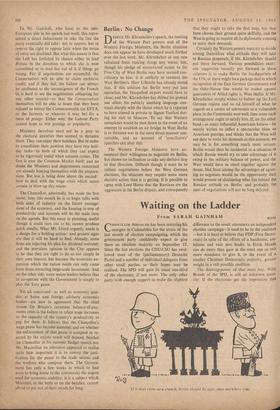Berlin : No Change
DESPITE Mr. Khrushchev's speech, the meeting of the Warsaw Pact powers and of the Western Foreign Ministers, the Berlin situation does not appear to have developed much further over the last week. Mr. Khrushchev at any rate refrained from making things any worse; but, though his pledge of unrestricted access to the Free City of West Berlin may have seemed con- ciliatory to him, it is unlikely to reassure the West Berliners. Herr Ulbricht has already stated that, if this solution for Berlin were put into operation, the Tempeihof airport would have to close; and Mr. Khrushchev has shifted his ground too often; his publicly soothing language con- trasts sharply with the threat which he is reported to have uttered in private to Signor Fanfani dur- ing his visit to Moscow. To say that Western aeroplanes would be shot down in the event of an attempt to establish an air bridge to West Berlin is to threaten war in the most direct manner con- ceivable, and no amount of 'conciliatory' speeches can alter this.
The Western Foreign Ministers have an- nounced their willingness to negotiate on Berlin, but shown no inclination to take any decisive step in that direction. Difficult though it must be to initiate negotiations before the West German elections, the situation may require some more decisive action than it is getting. It is possible to agree with Lord Home that the Russians are the aggressors in the Berlin dispute, and consequently that they ought to take the first step; but they have chosen their ground quite skilfully, and the West is going to require all its diplomatic cunning to resist their demands.• Certainly the Western powers must try to decide among themselves what attitude they will take to Russian proposals, if Mr. Khrushchev should put them forward. Various possibilities exist : one suggestion recently put forward in these columns is to make Berlin the headquarters of the UN; or there might be a package deal in which recognition of the East German Government and the Oder-Neisse line would be traded against guarantees of Allied rights ir. West Berlin. If Mr. Khrushchev simply wishes to bolster up the. East German regime and to rid himself of what he regards as a centre of subversion at a vulnerable place in the Communist west wall, then some such arrangement ought to satisfy him. If, on the other hand—as many influential Americans believe—he merely wishes to inflict a spectacular blow to American prestige, and thinks that the West will not dare to resist his demands at this moment, we may be in for something much more serious. Berlin would then be incidental to a situation in which Russia would try to take advantage of a swing in the military balance of power, and the West would have to stand together against the threat. Not least among the advantages of agree- ing to negotiate would be the opportunity they would present of elucidating what lies behind the Russian, attitude on Berlin; and probably the start of negotiations will not be long delayed.






























 Previous page
Previous page